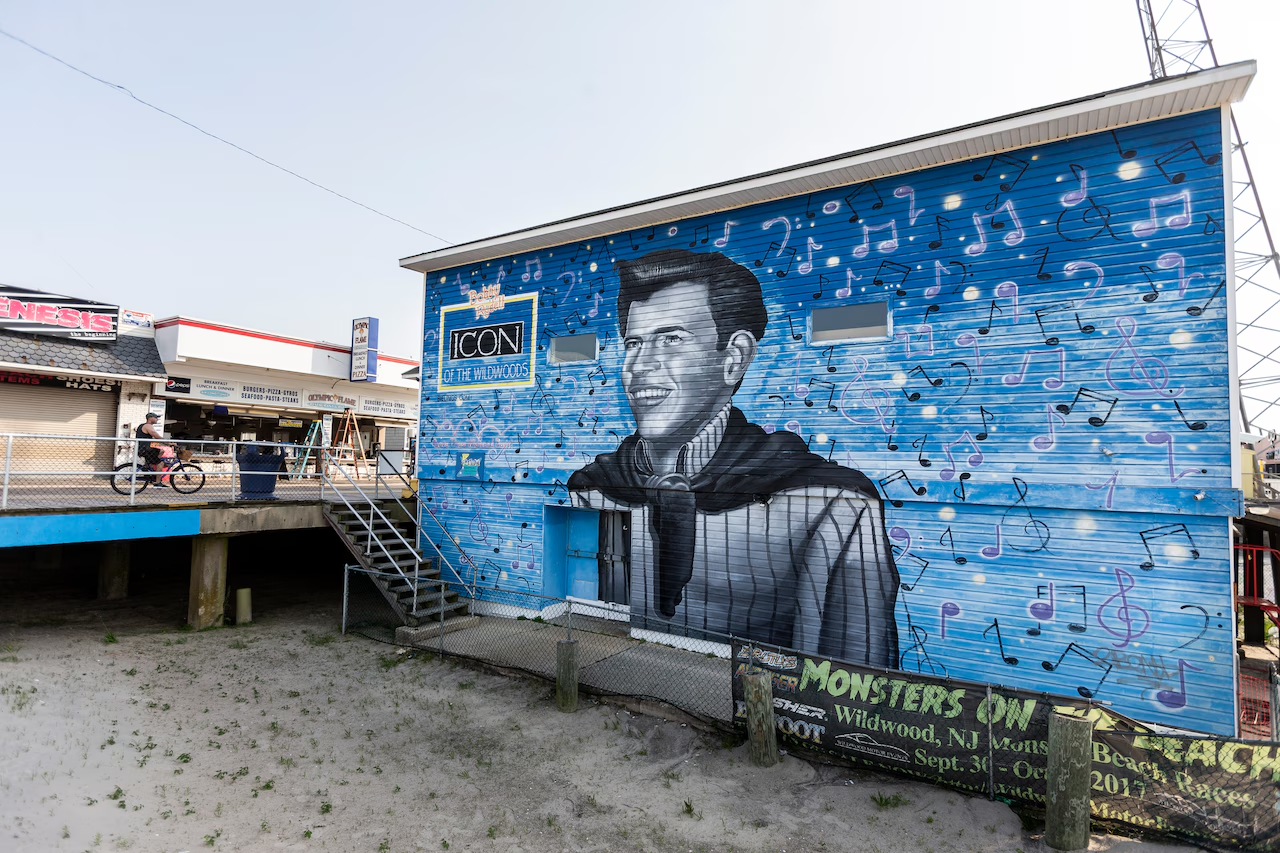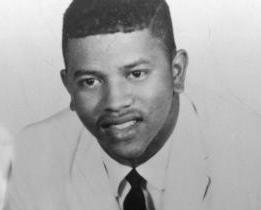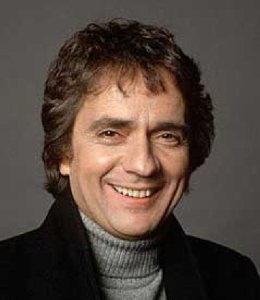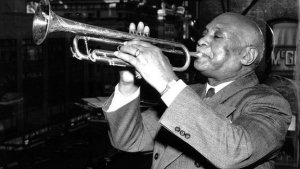 Bobby Rydell (80) – early teen idol – was born on April 26, 1942 in Philadelphia and was the son of Jennie Ridarelli (née Sapienza) and Adrio “Al” Ridarelli. Both of his parents were of Italian descent. He grew up in the Lower Moyamensing neighborhood of South Philadelphia.
Bobby Rydell (80) – early teen idol – was born on April 26, 1942 in Philadelphia and was the son of Jennie Ridarelli (née Sapienza) and Adrio “Al” Ridarelli. Both of his parents were of Italian descent. He grew up in the Lower Moyamensing neighborhood of South Philadelphia.
As a child, he mimicked the singers he saw on television, and at the age of seven his father Adrio took him around the clubs of Philadelphia, asking if he could sing and do some impersonations. Adrio loved big-band jazz and often took his son to see his favorite bands, including Benny Goodman and Artie Shaw. Bobby shared his dad’s enthusiasm for the music, and inspired by Goodman‘s flashy drummer Gene Krupa, he began learning to play the drums. Bobby soon showed he had the skills to be an all-around entertainer, and by the time he was eight, he was singing at local nightspots. At the age of nine, he made his television debut, appearing on a talent showcase, TV Teen Club, hosted by bandleader Paul Whiteman. The show marked his first appearance using the stage name Bobby Rydell; legend had it Whiteman suggested the more streamlined name since he had trouble pronouncing Ridarelli. Whiteman was impressed with Rydell’s voice and likable persona, and the young singer became a regular on the show.
Rydell played in several bands in the Philadelphia area. As a 14-year-old he was the drummer for the Emanons (NoName spelled backward) which included his childhood friend Pat Azzara on guitar. Azzara later assumed the stage name Pat Martino, and went on to achieve recognition as one of the preeminent jazz guitarists of all time. Another band was Rocco and the Saints, in which he sang and played drums. After releasing three unsuccessful singles for small companies, he signed a recording contract with Cameo Records. This was run by Bernie Lowe, who had been the pianist accompanying him on TV Teen Club. After a couple of flops, “Kissin’ Time” made the charts in 1959. In May 1960, Rydell toured Australia with The Everly Brothers, Billy “Crash” Craddock, Marv Johnson, The Champs, The Crickets, and Lonnie Lee.
Rydell was on his way to become a rock and roll teen sensation. Along with Frankie Avalon and Fabian, Rydell was one of the leading Philadelphia-based stars who dominated the pop charts (and the TV show American Bandstand) in the years after Elvis Presley went into the Army and before the British Invasion changed the landscape of rock & roll. Rydell had both talent and charm, and sustained a career as a singer longer than many of his peers; he was in demand as a live performer decades after his days as a hitmaker ended in 1964.
But Between 1959 and 1964, Rydell would place 19 songs into the Pop Top 40, including “Wild One,” “Swingin’ School,” “Sway,” and “Volare.” Rydell was also a popular live attraction, selling out shows across the country and headlining concert tours in Australia, New Zealand, Europe, Japan, and the United Kingdom.
His second success was “We Got Love“. The album of the same name, his first, sold a million copies and obtained gold disc status. “Wild One” was followed with “Little Bitty Girl” which was his second million-selling single. He continued releasing hit songs with “Swingin’ School” backed by “Ding-A-Ling” and “Volare” later in 1960, which also sold over a million copies. It is estimated he sold over 25 million records in total.
In 1961, he performed at the Copacabana in New York City, where he was the youngest performer to headline at the nightclub. In February 1961, he appeared at the Festival du Rock at the Palais des Sports de Paris in Paris, France.
Rydell’s success and prospects led his father, Adrio, a foreman at the Electro-Nite Carbon Company in Philadelphia, to resign in 1961 after 22 years to become his son’s road manager.
 In 1963, Rydell released the song “Wildwood Days“, which reached Number 17 on the Billboard Hot 100 chart and remained there for nine weeks. A mural on the Wildwood, New Jersey, boardwalk, painted in 2014, honors Rydell, whose song placed the community in the national spotlight.
In 1963, Rydell released the song “Wildwood Days“, which reached Number 17 on the Billboard Hot 100 chart and remained there for nine weeks. A mural on the Wildwood, New Jersey, boardwalk, painted in 2014, honors Rydell, whose song placed the community in the national spotlight.
That same year, Rydell portrayed Hugo Peabody in the film version of Bye Bye Birdie, also starring Ann-Margret and Dick Van Dyke. The original stage production of Bye Bye Birdie had no real singing role for the character of Hugo, but the movie script was rewritten specifically to expand the part for Rydell. In 2011, Sony Pictures digitally restored the film. Rydell and Ann-Margret were in attendance at the restoration premiere in Beverly Hills, hosted by the Academy of Motion Picture Arts and Sciences.
During the 1960s, Rydell had numerous hit records on the Billboard Hot 100 chart. His recording career earned him 34 Top 100 hits, placing him in the top five artists of his era (Billboard). They included his most popular successes: “Wild One” (his highest scoring single, at number 2), “Volare” (number 4), “Swingin’ School” (number 5), “Kissin’ Time” (number 11), “Sway” (number 14), “I’ve Got Bonnie” (number 18), and “The Cha-Cha-Cha” (number 10). His last major chart success was “Forget Him“, which reached number 4 on the Hot 100 in January 1964. The song, written by Tony Hatch, was his fifth and final gold disc winner.
Rydell left Cameo-Parkway Records later in 1964 and signed with Capitol Records. By that point, the British Invasion had arrived and acts such as Rydell suffered a dramatic decline in popularity. Bands such as The Beatles became more popular, and Rydell unknowingly inspired John Lennon and Paul McCartney to write “She Loves You“, a song which paved the way for their success in the US.
During that time, he performed on many television programs, including The Red Skelton Show, where a recurring role as Zeke Kadiddlehopper, Clem Kadiddlehopper’s younger cousin, was written for him by Skelton. He also appeared on The Danny Thomas Show, Jack Benny, Joey Bishop, and The George Burns Show. He was a regular on The Milton Berle Show and was a panelist on To Tell the Truth in 1964. On October 6, 1964, he made a guest appearance on the episode “Duel” of the television series Combat!. It was Rydell’s first dramatic acting role.
In January 1968, it was announced in the UK music magazine NME (New Musical Express) that Rydell had signed a long-term recording contract with Reprise Records. He then continued to perform in nightclubs, supper clubs and Las Vegas venues throughout the 1970s and 1980s, but his career was hampered by the refusal by ABKCO Records to reissue Rydell’s Cameo-Parkway catalog, so it was completely unavailable until 2005, although he did re-record his hits in 1995 for K-tel Records. He had one more hit after 1965, a disco re-recording of “Sway”, which reached the Billboard Easy Listening chart in 1976.
In 1985, promoter Dick Fox approached Rydell about appearing in a special for PBS in which he would perform alongside fellow Philadelphia teen idols Frankie Avalon and Fabian. Rydell agreed, and the show, called “The Golden Boys,” clicked with viewers. In response, Fox booked a concert tour for the Golden Boys, with Rydell and his co-stars discovering their old fans were still eager to see them perform. The Golden Boys tours would provide the backbone of Rydell’s career well into the 2010s, and when a long struggle with alcoholism led to him receiving kidney and liver transplants in July 2012, he was back at work the following October. March 2013 saw him sidelined again when he had cardiac bypass surgery, but ever the trooper, Rydell bounced back to play an 11-date Australian tour in February 2014. His autobiography was published in 2016.
Bobby Rydell maintained a steady touring schedule into the final years of his life; he died on April 5, 2022 due to complications of pneumonia. He was 79 years old.
• In additional to the Grease namecheck, Rydell’s legacy lives on in his hometown area, where at least two streets bear his name, and in the 2018 Oscar-winning film Green Book, in which he was portrayed by actor Von Lewis.
• His influence can also be heard in one of the most enduring and popular songs of the 1960s: The Beatles’ “She Loves You.” Paul McCartney has said that he and John Lennon were inspired to write the instantly famous “yeah yeah yeah” lyrics after hearing a similar call-and-response approach in a popular Rydell song, most likely the 1960 hit “Swingin’ School,” in which Rydell sings, “Yeah yeah yeah I go a swingin’ school.”

 March 17, 2019 – Bernie Tormé (guitarist for Ozzy, Gillan, Dee Snider and others) was born in Dublin on March 18, 1952, where he learned to play guitar. In 1974 he moved to London, joining bassist John McCoy in heavy rockers Scrapyard. After forming the Bernie Tormé Band two years later, he re-joined McCoy as a member of former Deep Purple singer Ian Gillan’s new solo project, playing on four Gillan albums: Mr. Universe, Glory Road, Future Shock and Double Trouble.
March 17, 2019 – Bernie Tormé (guitarist for Ozzy, Gillan, Dee Snider and others) was born in Dublin on March 18, 1952, where he learned to play guitar. In 1974 he moved to London, joining bassist John McCoy in heavy rockers Scrapyard. After forming the Bernie Tormé Band two years later, he re-joined McCoy as a member of former Deep Purple singer Ian Gillan’s new solo project, playing on four Gillan albums: Mr. Universe, Glory Road, Future Shock and Double Trouble.




 January 20, 2017 – Ronald ‘Bingo’ Mungo was born April 20, 1940 in Alleghany County, Pennsylvania. Just out of high school he joined the doo wop group The Marcels, named after a popular 1950s hairstyle ‘the Marcel wave’.
January 20, 2017 – Ronald ‘Bingo’ Mungo was born April 20, 1940 in Alleghany County, Pennsylvania. Just out of high school he joined the doo wop group The Marcels, named after a popular 1950s hairstyle ‘the Marcel wave’. January 18, 2016 – Glenn Frey was born on Nov. 6, 1948 in Detroit and was raised in nearby Royal Oak. He grew up on both the Motown sounds and harder-edged rock of his hometown. He played in a succession of local bands in the city and first connected with Bob Seger when Frey’s band, the Mushrooms, convinced Seger to write a song for them. Frey can also be heard singing extremely loud backing vocals (particularly on the first chorus) on Seger’s first hit and Frey’s first recorded appearance, 1968’s “Ramblin’ Gamblin’ Man.”
January 18, 2016 – Glenn Frey was born on Nov. 6, 1948 in Detroit and was raised in nearby Royal Oak. He grew up on both the Motown sounds and harder-edged rock of his hometown. He played in a succession of local bands in the city and first connected with Bob Seger when Frey’s band, the Mushrooms, convinced Seger to write a song for them. Frey can also be heard singing extremely loud backing vocals (particularly on the first chorus) on Seger’s first hit and Frey’s first recorded appearance, 1968’s “Ramblin’ Gamblin’ Man.” December 27, 2015 – Stevie Wright (The Easybeats) was born Stephen Carlton Wright on December 20, 1947 in Leeds, England. When he was 9, his family moved to Melbourne, Australia and four years later to Sydney where they lived in Villawood near the Villawood Migrant Hostel. He was lead vocalist for local band, The Outlaws, and by 1964 had formed Chris Langdon & the Langdells, which initially played The Shadows-styled surf music, but converted to beat music under the influence of The Beatles.
December 27, 2015 – Stevie Wright (The Easybeats) was born Stephen Carlton Wright on December 20, 1947 in Leeds, England. When he was 9, his family moved to Melbourne, Australia and four years later to Sydney where they lived in Villawood near the Villawood Migrant Hostel. He was lead vocalist for local band, The Outlaws, and by 1964 had formed Chris Langdon & the Langdells, which initially played The Shadows-styled surf music, but converted to beat music under the influence of The Beatles. January 29, 2015 – Rod McKuen was born on April 29th, 1933 in Oakland, CA. He ran away from home at the age of 11 and drifted along the West Coast, supporting himself as a ranch hand, surveyor, railroad worker, rodeo cowboy, lumberjack, stuntman and radio disk jockey.
January 29, 2015 – Rod McKuen was born on April 29th, 1933 in Oakland, CA. He ran away from home at the age of 11 and drifted along the West Coast, supporting himself as a ranch hand, surveyor, railroad worker, rodeo cowboy, lumberjack, stuntman and radio disk jockey. January 18, 2015 – Dallas Taylor Jr. was born April 7th 1948 in Denver, Colorado, and grew up mostly in San Antonio and Phoenix. His father, a pilot who had flown in World War II, was later killed performing stunts in an air show. His parents had been divorced years earlier. It was his mother, the former Violet Cantu, who set him on his career path: When he was 10, she took him to see the movie “The Gene Krupa Story,” about the legendary drummer. She died of a heart attack when he was 13.
January 18, 2015 – Dallas Taylor Jr. was born April 7th 1948 in Denver, Colorado, and grew up mostly in San Antonio and Phoenix. His father, a pilot who had flown in World War II, was later killed performing stunts in an air show. His parents had been divorced years earlier. It was his mother, the former Violet Cantu, who set him on his career path: When he was 10, she took him to see the movie “The Gene Krupa Story,” about the legendary drummer. She died of a heart attack when he was 13.
 March 16, 2013 – Bobby Smith was born in Detroit, Michigan on April 10, 1936. He became the principal lead singer of the classic Motown group, The Spinners at the group’s inception in 1954.
March 16, 2013 – Bobby Smith was born in Detroit, Michigan on April 10, 1936. He became the principal lead singer of the classic Motown group, The Spinners at the group’s inception in 1954. January 16, 2013 – Nic Potter was born on 18 October 1951 in Swindon, England.
January 16, 2013 – Nic Potter was born on 18 October 1951 in Swindon, England.
 August 12, 2009 – Les Paul( birth name Lester William Polfus) was born on June 9th 1915 in in Waukesha, Wisconsin.
August 12, 2009 – Les Paul( birth name Lester William Polfus) was born on June 9th 1915 in in Waukesha, Wisconsin.
 April 30, 2007 – Zola Taylor (The Platters) was born in Los Angeles, California on March 17th 1938. She became the only female member of The Platters from 1954 to 1962, when the group produced most of their popular singles such as “My Prayer”, “Twilight Time”, “Harbor Lights”, “To Each His Own”, “If I Didn’t Care” and “Smoke Gets in Your Eyes”.
April 30, 2007 – Zola Taylor (The Platters) was born in Los Angeles, California on March 17th 1938. She became the only female member of The Platters from 1954 to 1962, when the group produced most of their popular singles such as “My Prayer”, “Twilight Time”, “Harbor Lights”, “To Each His Own”, “If I Didn’t Care” and “Smoke Gets in Your Eyes”.
 February 8, 2005- Keith Knudsen (Doobie Brothers) was born in Le Mars, Iowa on February 18th 1948. He began drumming while in high school. After short stints playing in a club band and the Blind Joe Mendlebaum Blues Band, he became the drummer for the organist-vocalist Lee Michaels.
February 8, 2005- Keith Knudsen (Doobie Brothers) was born in Le Mars, Iowa on February 18th 1948. He began drumming while in high school. After short stints playing in a club band and the Blind Joe Mendlebaum Blues Band, he became the drummer for the organist-vocalist Lee Michaels. November 19, 2003 – Greg Ridley was born October 23, 1947 played bass with Spooky Tooth and Humble Pie. Born in Carlisle in 1947, Greg Ridley joined his first group in the early Sixties. He was Dino in a short-lived outfit called Dino and the Danubes before teaming up
November 19, 2003 – Greg Ridley was born October 23, 1947 played bass with Spooky Tooth and Humble Pie. Born in Carlisle in 1947, Greg Ridley joined his first group in the early Sixties. He was Dino in a short-lived outfit called Dino and the Danubes before teaming up  March 27, 2002 – Dudley Moore was born on April 19th 1935. As an actor, musician, comedian and composer he first came to prominence as one of the four writer-performers in Beyond the Fringe in the early 1960s and became famous as half of the popular television double-act he formed with Peter Cook.
March 27, 2002 – Dudley Moore was born on April 19th 1935. As an actor, musician, comedian and composer he first came to prominence as one of the four writer-performers in Beyond the Fringe in the early 1960s and became famous as half of the popular television double-act he formed with Peter Cook.

 February 22, 1994 – Papa John Creach (Jefferson Airplane) was born in Beaver Falls, Pennsylvania on May 28th, 1917.
February 22, 1994 – Papa John Creach (Jefferson Airplane) was born in Beaver Falls, Pennsylvania on May 28th, 1917.
 March 16, 1975 – T-Bone Walker was born Aaron Thibeaux Walker on May 28, 1910 in Linden, Texas. American blues guitarist, pianist and singer/ songwriter.
March 16, 1975 – T-Bone Walker was born Aaron Thibeaux Walker on May 28, 1910 in Linden, Texas. American blues guitarist, pianist and singer/ songwriter.
 March 28, 1958 – WC Handy was born November 16, 1873 in Florence, Alabama.
March 28, 1958 – WC Handy was born November 16, 1873 in Florence, Alabama.






You must be logged in to post a comment.